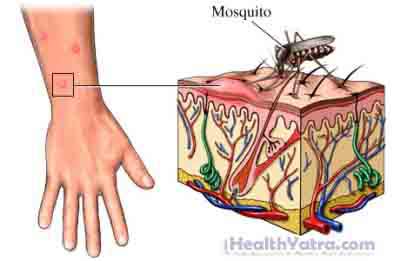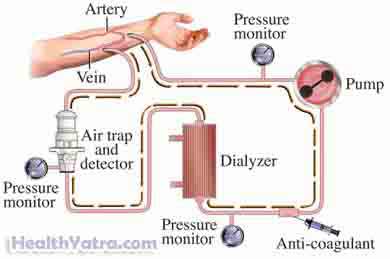Definition
Yellow fever is a disease carried by female mosquitoes of two species ( Aedes andHaemogogus species). Mosquitoes pass yellow fever to humans through a small amount of saliva when they bite. The species of mosquito that carry yellow fever are native to sub-Saharan Africa and South America, but can also be found in other areas.
Yellow fever can cause flu -like symptoms, yellowing of both the skin and the whites of the eyes, and can cause death. Yellow fever is a rare disease in travelers because many get the vaccine, but is endemic in impoverished areas because the people cannot afford to get vaccinated. If you live in or have recently visited sub-Saharan Africa or South America, and believe you may have yellow fever, see your doctor.
Causes
The yellow fever virus is the cause of yellow fever. Yellow fever virus is transmitted to humans when an infected mosquito bites a person. Yellow fever is not communicable, meaning it cannot be passed directly from one person to another.

Risk Factors
The following factors increase your chance of getting yellow fever:
- Living, working, or traveling in jungle or urban areas with yellow fever, including:
- Sub-Saharan Africa
- Many countries in Africa have constant cases of yellow fever
- South America
- Bolivia, Brazil, Colombia, Ecuador, and Peru are among the highest risk in South America
- Sub-Saharan Africa
- Failure to take proper precautions. Precautions include the following:
- Receiving the yellow fever vaccination
- Reducing contact with mosquitoes (for example, using bed nets, long-sleeved clothing, and screens)
- Using insect repellents
Symptoms
Yellow fever has two phases: acute and toxic. All individuals infected with yellow fever will experience the acute phase. Fifteen percent of people with yellow fever will progress into the toxic phase.
If you experience any of the following symptoms, do not assume that it is due to yellow fever. Many of them also occur due to other less serious illnesses such as the flu. However, if you experience any of these symptoms, seek medical attention.
Acute Phase
- Fever
- Headache
- Muscle pain
- Backache
- Chills
- Loss of appetite
- Nausea and/or vomiting
Toxic Phase
- High fever
- Abdominal pain
- Bleeding from the gums, nose, eyes, and/or stomach
- “Black” vomit (vomit that appears black due to blood content)
- Low blood pressure
- Liver failure, which may lead to jaundice (yellowing of the skin and whites of the eyes)
- Kidney failure
- Confusion
- Seizure
- Coma
- Death (approximately 50% of toxic phase patients die)
Yellow fever symptoms appear 3 to 6 days after a person is bitten by an infected mosquito. Typically, acute phase symptoms will persist for 3 to 4 days, and then disappear. If an infected person is going to progress into the toxic phase, toxic phase symptoms will begin within 24 hours of the end of the acute phase. When a person recovers from yellow fever, they are considered to have lifetime immunity from the disease.
Diagnosis
Your doctor will ask you about your symptoms, medical history, and when and where you traveled. Your doctor will then perform a physical exam, and order blood tests to screen for signs of yellow fever in your blood.
Treatment
Currently, medications or treatments specifically for yellow fever are not available. However, there are treatments that that can be given at a hospital to ease some symptoms of yellow fever.
Hydration
It is important to keep the body hydrated. Fluids containing electrolytes and salts may be given orally, or may be injected through a vein to prevent dehydration.
Fever Reduction Methods
Cool water or fever reducing medications (for example, Tylenol) may be given to reduce fever.
Kidney Dialysis
In toxic phase cases, dialysis may be needed to help the kidneys filter waste.

Blood Transfusion
In toxic phase cases, a transfusion may be needed to replace blood cells and clotting agents lost through bleeding.
Antibiotics for Secondary Infections
Fighting yellow fever may cause a person’s immune system to become temporarily weak. A weak immune system cannot guard against bacterial infections as it normally would, so infections occur more easily. Antibiotics may be given to fight bacterial infections if they occur. Antibiotics cannot be given to treat yellow fever because yellow fever is a virus, and viruses do not respond to antibiotics.
Prevention
Vaccination is the best way to prevent yellow fever. The yellow fever vaccine is recommended for people aged 9 months to 59 years who are traveling to or living in areas where the disease is present. Your doctor will help decide if the vaccine is right for you.
Other ways to reduce your risk of being bitten by a mosquito include:
- Staying in air-conditioned or well-screened areas
- Wearing long-sleeved clothing and long pants
- Using bed netting while sleeping
- Removing or destroying mosquito-breeding areas—Mosquitoes lay their eggs in standing pools of water, such as the inside of old tires, flower pots, and small puddles.
- Using insect repellents containing DEET and Permethrin on clothes, exposed skin, and on bed nets for extra protection
